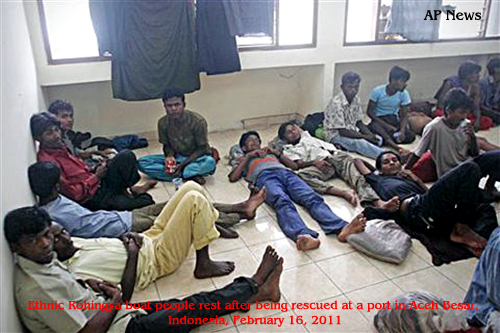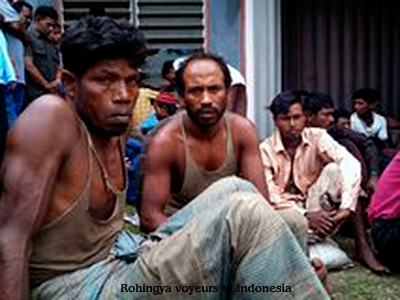Chittagong, Bangladesh: Amnesty International (AI) emphasized that Rohingya would be at risk of human rights violations if returned to Burma, according to a press release from AI today...
Chittagong, Bangladesh: Amnesty International (AI) emphasized that Rohingya would be at risk of human rights violations if returned to Burma, according to a press release from AI today.
 “No Rohingya, or other asylum seekers, should be returned to Burma against their will if they have a well-founded fear of persecution,” the press release stated.
“No Rohingya, or other asylum seekers, should be returned to Burma against their will if they have a well-founded fear of persecution,” the press release stated.
“AI calls on the governments of Thailand, India, and Indonesia to act on their obligations under international human rights and customary international law, including giving persons claiming to be Rohingya on their territory access to full and fair refugee determination procedures, and to grant the United Nations refugee agency (UNHCR) access to them.”
AI has urged Burma to stop the systematic persecution of the Rohingya, and it has also urged Burma’s neighbours to provide the UN Refugee Agency immediate access to all Rohingya in their territory. It has also encouraged the neighboring countries to ratify the UN Convention relating to the Status of Refugees, its 1967 Protocol, and the UN Convention relating to the Status of Stateless Persons, the statement stated.
“Hundreds of Rohingya fleeing systematic persecution in Burma require immediate assistance from Thailand, India, and Indonesia.”
According to the AI statement, “A group of 91 persons believed to be Rohingya, who landed on the Andaman Islands, India, in early February 2011, claim that the Thai Navy put them out to sea in January 2011 in an engineless boat with limited food and water. Thai authorities, however, claim that they returned 91 persons detained in Thailand to Burma in late January 2011. The AI calls on the government of Thailand to institute a prompt, independent, and transparent investigation into how Thai authorities treated this group.
Thai authorities have detained hundreds of individuals claiming to be Rohingya, including children, since January 2011.
A further 129 persons claiming to be Rohingya arrived in Aceh, Indonesia, on 17 February 2011 where one is 13- year-old boy.
A 45-foot (14-meter) wooden boat carrying 129 Rohingya, a minority Muslim community from Burma, was found drifting off Indonesia's Sumatra Island by Indonesian fishermen. The men had been at sea for about three weeks when their boat experienced engine trouble, said Aceh Provincial Maritime Police Chief Mohammed Zaini.
“We have given them food, and are now carrying out medical check-ups. We are coordinating with the immigration office, the government in Jakarta, and the International Organisation for Migration for follow-up action.”
 “The men, many looking pale and tired, were being temporarily housed near the provincial capital Banda Aceh at the northern tip of Sumatra Island after being rescued on February 16. Seven of them received medical attention.”
“The men, many looking pale and tired, were being temporarily housed near the provincial capital Banda Aceh at the northern tip of Sumatra Island after being rescued on February 16. Seven of them received medical attention.”
"We left Burma because we had been treated cruelly by the military. Muslims in the area are often killed and tortured,” a boat voyager named Nur Alam, 27 years, said.
"We want to go to Indonesia, Malaysia, or any other country which is willing to take us in," he was quoted by AFP as saying. “So, we escape by sea.”
An estimated 200,000 Rohingya live in refugee camps in Bangladesh. Many of them—especially the majority that live in unofficial camps—attempt to escape poor conditions by trying to get to Southeast Asia across the Andaman Sea.
“We flee from Burma for safety, but here in Bangladesh we are also facing conditions similar to in Burma. So, most refugees are trying to find a safe way the deadly sea route,” said a refugee who hopes to travel by sea one day.
''This whole exercise is like a massive game of hiding the peanut under the ever-moving coconut shells—and only the Thais know where the peanut is,'' Human Rights Watch (HRW) spokesperson Phil Robertson told Phuketwan, an online news group in Phuket.
''The Thai government should be much more transparent on how many Rohingya are being detained, and provide details on who the individuals are, which immigration detention centers they are in, and what special measures are being taken to protect children under 18, who should not be locked up with adults. And, as we have called for already, the Thai government should provide immediate, unhindered access to the UN High Commissioner for Refugees to conduct refugee screening determination and commit to release from detention all those Rohingya determined to be refugees.''
"The Rohingyas are a doubly-threatened community," says Anoop Sukumaran, coordinator of the Bangkok-based Asia-Pacific Refugee Rights Network. "They perfectly fit the profile of refugees, and also fit the profile of stateless people."
Ninety-one starving Rohingya were found by police in India’s Andaman and Nicobar Islands. They had been “pushed out” into peril on the open sea by the Thai military with few rations or water in an engineless boat, according to statements from the Indian authorities, which means the actions of the Thai military authorities reveal that they wanted these distressed boat people to be drowned as they did in January 2009.
The Arakan Rohingya National Organisation (ARNO) condemns Thailand’s deadly action against the suffering Rohingya people, according to an ARNO press release on February 14.
"The Rohingya still have a reason to flee and seek refugee status," says Nurul Islam, president of the Arakan Rohingya National Organisation (ARNO), a London-based network campaigning for the Rohingya’s political rights. "The situation is worsening with increased human rights violations and abuses by the border security forces."
"Restrictions on education, trade, and business are still imposed, and arrest, torture, and extortion are a regular phenomenon.”
“There is no freedom of religion, and mosques cannot conduct repairs without permission from the concerned authorities."
In fact, few among Burma’s nearly 135 ethnic minority groups have been subject to the scale of abuse by government troops as much as the Rohingya have in Arakan State. The military regime even announced that the Rohingya were not Burmese citizens, have restricted their movement between villages, banned them from freely getting married, and subjected many members of the community to forced labour.
A wave of oppression unleashed in 1991, saw close to 250,000 Rohingyas flee Arakan state for neighbouring Bangladesh. Currently, over 1.5 million Rohingya live in exile in countries such as Saudi Arabia, Pakistan, India, Bangladesh, Malaysia, and Thailand.



